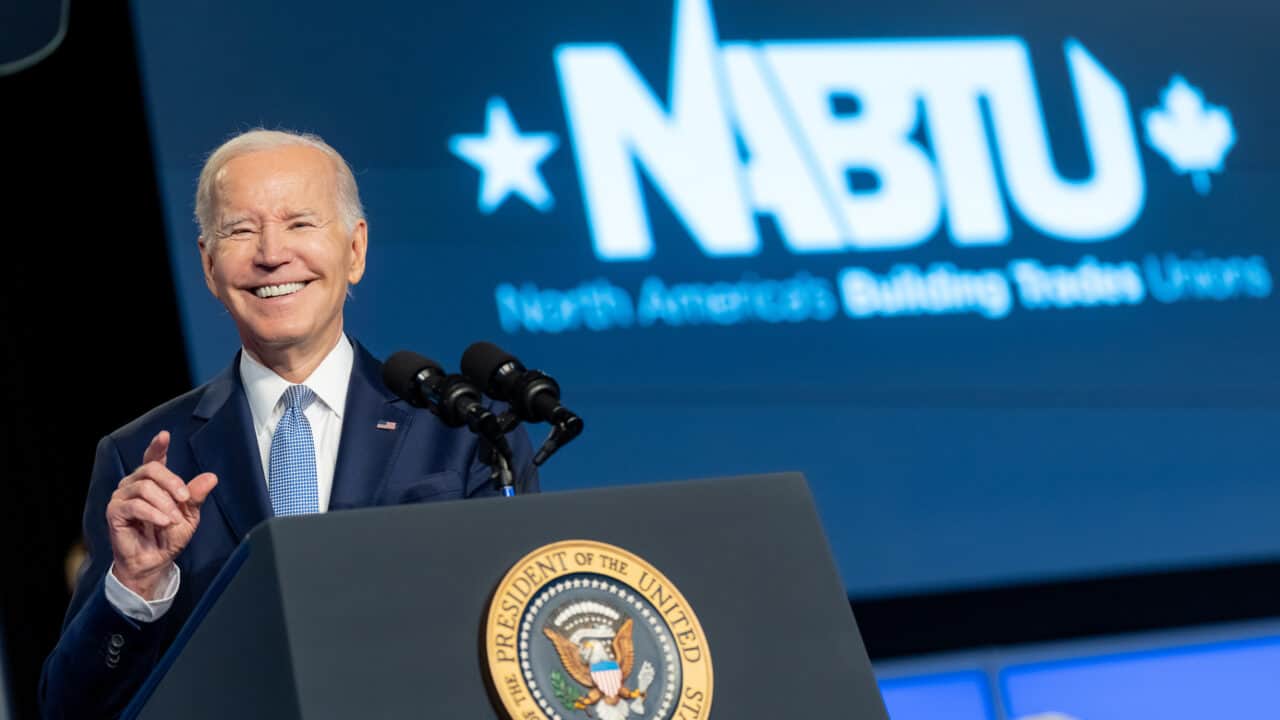 "President Joe Biden delivers remarks on his 'Investing in America' agenda at the North America’s Building Trades Union National Legislative Conference" by Adam Schultz is licensed under public domain.
"President Joe Biden delivers remarks on his 'Investing in America' agenda at the North America’s Building Trades Union National Legislative Conference" by Adam Schultz is licensed under public domain.
Labor unions in the U.S. and Europe are using Biden’s unaccountable trade council to whittle away at Americans’ right to work.
From the start of the Biden administration’s Trade and Technology Council, an ad hoc working group with the European Union and U.S. trade officials, any progress on easing economic tensions was going to be slow and difficult. The Biden administration allowed Trade Promotion Authority to lapse preventing oversight from Congress and the White House from committing to any kind of comprehensive agreement, in their view features.
Ameliorating retaliatory tariffs over steel and aluminum imposed by the U.S., digital service taxes from the EU, and escalating tariffs over airline subsidies were the first order of business for the negotiators when the venture started.
In classic Bindenomic fashion the White House has snowballed these into other problems. The tariffs over unfair airline subsidies are suspended for three more years while both sides “coordinate” on interference with non-market entities. The Administration mutated U.S. objections to digital service taxes into the OECD Global Minimum Tax (which is thankfully delayed by the Senate). Finally, the steel and aluminum tariffs were tucked into a suicide pact set to expire in October if the two sides don’t agree to a “green steel” deal. Europe has already rejected one proposal by the Biden team due to its flagrant violations of global trade rules.
But, sending easy trade issues into quagmires is also an intended feature of the Administration. It has derided trade agreements that include greater market access for American exporters and enforceable rules as a “race to the bottom” and part of a “colonial mindset.”
It is just the opposite for the European Union which has nine economy encompassing trade agreements on the docket including with American trade partners like Mexico, the Mercosur bloc, Chile, India, and New Zealand.
The Biden administration further stoked flames with manufacturers in the European Union when it signed the Inflation Reduction Act (IRA) into law. The IRA contains an estimated $200 billion in taxpayer subsidies to incentivize electric vehicle production. However, to secure the critical vote of Sen. Joe Manchin (D-W.Va.) required to pass the IRA, the Biden administration was forced to acquiesce to strict North America sourcing requirements for EVs to be eligible for IRA subsidies. This limited the scope of EV subsidies further than the Biden administration desired and invited criticism over protectionist policy from Europe.
Eager to appease the EU and expand EV subsidies beyond the IRA’s limitations, Biden’s IRS and Treasury are now skirting U.S. law by redefining what a Free Trade Agreement is in order to grant the White House power to negotiate “Critical Mineral Agreements” without approval from Congress.
Enter the Rapid Response Mechanism (RRM), born in the final days of U.S.-Mexico-Canada negotiations by former Speaker Nancy Pelosi’s office to garner enough Democrat support to pass the agreement.
At the last TTC it became clear that in the upcoming Critical Mineral Agreement negotiations European and American labor have targeted replicating a RRM. Unlike the Biden’s White House, the EU had a public process to identify and approve negotiating objectives, it includes a whole pillar on labor rights.
In the USMCA, the RRM allows the U.S. government to intervene in individual facilities in Mexico when it has a good faith “belief” workers have been denied the right of free association and collective bargaining. It has been used several times to eventually allow workers to re-vote for unionization and re-negotiate collective bargaining agreements.
It is one-sided. There are far fewer “covered” facilities in the U.S. than virtually all facilities in Mexico where the RRM can come in to play, because the United States already has an established body of effective labor law and process to enforce labor rights.
Yet, EU and American labor activists see the upcoming critical mineral negotiations as an opportunity to weaken those laws to allow labor activists from both sides of the Atlantic to kneecap American competitiveness on American soil by going around existing American law.
Right-to-Work states shield non-union workers from being forced to pay union dues or join a union as a condition for employment. Europeans don’t like that. This vital worker freedom provided by Right-to-Work is a competitive advantage attracting foreign manufacturers from the EU such as BMW, Daimler AG, Unilever, BASF, Michelin, and Airbus to set up shop in the U.S. Not to mention all the American workers who have flocked to these states to get out of the heel of forced unionization. Of course, competitive tax rates and a highly skilled labor force play a role in attracting foreign investment as well.
The Biden administration has traded away American competitiveness at the WTO when it agreed to give away intellectual property rights for COVID vaccines and at the OECD when it proposed the Global Minimum Tax deal. Carving out loopholes in American labor laws to appease activists will be another dent in American greatness, and an affront to Congress’ responsibility to legislate law and approve of trade agreements.
Doling out more handouts to silence critics isn’t how a constitutional democracy works. The Biden-Harris administration should take a clue from the unanimous interjection by the Ways & Means Committee into future U.S.-Taiwan negotiations and get marching order from Congress first before scheming with activists abroad.

